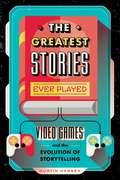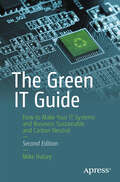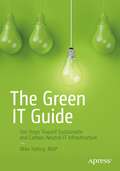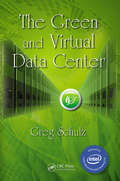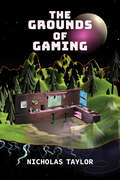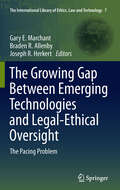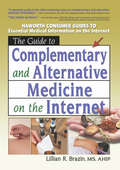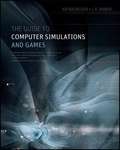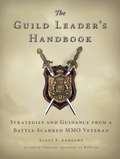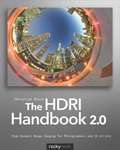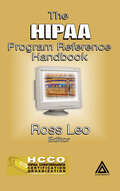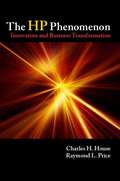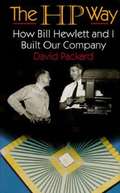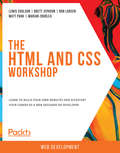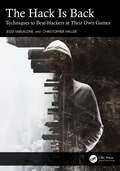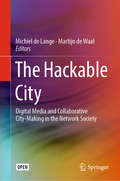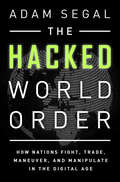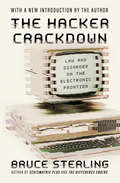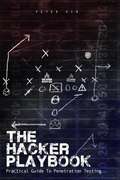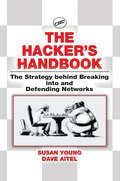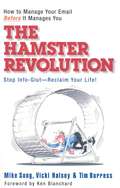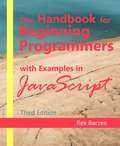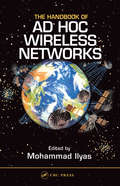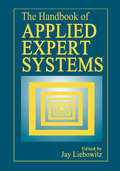- Table View
- List View
The Greatest Stories Ever Played: Video Games and the Evolution of Storytelling (Game On #2)
by Dustin HansenIn this fun and informative YA Non-fiction title, Dustin Hansen, author of Game On!, a self-confessed video game addict with over 20-years experience in the gaming industry, examines the storytelling skills shown in some of the most beloved and moving games of all time.We all know that video games are fun, but can a video game make you cry? Can it tell you a powerful love story? Can a video game make you think differently about war? About the environment? About the choices you make?Whether it's playing through blockbuster-esque adventures (Uncharted, God of War, The Last of Us), diving deep into hidden bits of story and lore (Red Dead Redemption II, Bioshock, Journey) or building relationships that change the fate of the world itself (Persona 5, Undertale), video games are bringing stories to life in ways that are immediate, interactive and immersive. Focusing on some of the best, most memorable, experiences in gaming, The Greatest Stories Ever Played, examines the relationship between gaming and storytelling in a new way.
The Green IT Guide: How to Make Your IT Systems and Business Sustainable and Carbon Neutral
by Mike HalseyMake your IT systems the solution to climate change rather than the cause. More and more we&’re relying on an ever-increasing number of different computer types and services, powerful smartphones, and cloud data centers. All of this carries with it a carbon footprint and a negative impact on the environment, and your business or organization will come under increasing scrutiny and criticism from customers, stakeholders, and governments. It doesn&’t have to be this way though, and with the right information, some careful planning, and the sensible use of different technologies, you could be helping both the planet and people worldwide and in your local communities. With this guide, author Mike Halsey gives you the information you need to head towards a sustainable, carbon-neutral or even carbon-negative future. This second edition discusses the impact of the latest technologies, including SoC (System on a Chip) PCs, and artificial intelligence (AI). It details how these technologies can help your business achieve its climate goals, and what challenges are involved, especially with the enormous power consumption of AI in the cloud. Additionally, this edition includes how regulation, both nationally and internationally, affects you, and how your business can become compliant and maintain high standards of sustainability into the future. It looks at the current uncertain state of the world, and how this can affect the cloud, IT supply chains, security, regulation, compliance, and business sustainability. What You Will Learn Choose sustainable IT equipment Find the most environmentally-friendly cloud, and business services Know how community and national and international projects can help you become more sustainable Consider what roles artificial intelligence (AI) and regulation play in business sustainability Look at the latest and future technologies to take your business towards carbon-neutrality Who This Book Is For Business leaders tasked by their company to find efficient ways to reduce the local, national, and global carbon footprint of their organization; IT professionals who want to find effective strategies for bringing their company in line with existing and forthcoming environmental standards and regulations; and individual power users who are keen to reduce the carbon footprint of their own IT systems
The Green IT Guide: Ten Steps Toward Sustainable and Carbon-Neutral IT Infrastructure
by Mike HalseyBecome part of the solution to climate change and learn how you can reduce the carbon footprint and increase the sustainability of your IT systems. Learn how to ensure new equipment is as power efficient, sustainable, and repairable as possible. Uncover the sustainability policies of your cloud and IT service providers so you can make thoughtful, cost-sensitive, and environmentally sound decisions when purchasing cloud-based SaaS and other services. Also learn to reduce e-waste in a way that inspires your employees, your stakeholders, and your customers. This book looks at our understanding of climate change and the impact that IT systems have through their constant demand for electrical power from increasingly over-stressed electrical grids and ever-rising energy costs. You will learn what you can do in your own business or organization to lower the electrical and carbon footprints of your IT systems. You will learn to discover the environmental policies of your cloud providers so you can make cloud-based computing choices with reduced carbon footprints in mind. Author Mike Halsey provides guidance for desktops, with a discussion of settings and practices that can reduce power usage of Windows systems, including home workers using their own equipment, and covering smartphones and tablets with all operating system types. The book will help you examine the broader world and how IT companies and business leaders are pressing ahead toward ambitious climate goals, and you will look at new technologies you can expect to see developed in support of those goals. What You Will LearnManage the power requirements of your existing IT equipment and systems more efficientlyEnsure high levels of power efficiency of any new IT equipment that you purchaseKnow where to look for the sustainability policies of cloud and IT serviceAsk the right questions of suppliers and stakeholdersInspire employees and stakeholders to want to do more to reduce their own carbon footprintWork within charitable, business, and governmental structures to reduce e-waste and help communitiesWho This Book Is ForFor business leaders and system administrators who have been tasked by their company to find cost-efficient and effective ways to reduce the local, national, and global carbon-footprint of their business or organization. For IT professionals looking to bring the company into line with existing and forthcoming national and international environmental standards and regulations. Also for individuals and power users who are keen to reduce the carbon-footprint of their own computer and IT systems.
The Green and Virtual Data Center
by Greg SchulzThe Green and Virtual Data Center sets aside the political aspects of what is or is not considered green to instead focus on the opportunities for organizations that want to sustain environmentally-friendly economical growth. If you are willing to believe that IT infrastructure resources deployed in a highly virtualized manner can be combined with other technologies to achieve simplified and cost-effective delivery of services in a green, profitable manner, this book is for you. Savvy industry veteran Greg Schulz provides real-world insight, addressing best practices, server, software, storage, networking, and facilities issues concerning any current or next-generation virtual data center that relies on underlying physical infrastructures. Coverage includes: Energy and data footprint reduction, Cloud-based storage and computing, Intelligent and adaptive power management, Server, storage, and networking virtualization, Tiered servers and storage, network, and data centers, Energy avoidance and energy efficiency. Many current and emerging technologies can enable a green and efficient virtual data center to support and sustain business growth with a reasonable return on investment. This book presents virtually all critical IT technologies and techniques to discuss the interdependencies that need to be supported to enable a dynamic, energy-efficient, economical, and environmentally-friendly green IT data center. This is a path that every organization must ultimately follow. Take a tour of the Green and Virtual Data Center website. CRC Press is pleased to announce that The Green and Virtual Data Center has been added to Intel Corporation's Recommended Reading List. Intel's Recommended Reading program provides technical professionals a simple and handy reference list of what to read to stay abreast of new technologies. Dozens of industry technologists, corporate fellows, and engineers have helped by suggesting books and reviewing the list. This is the most comprehensive reading list available for professional computer developers.
The Grounds of Gaming (Digital Game Studies)
by Nicholas TaylorHow do we make space for video games in the places where we live, work, and play—and who is allowed to feel welcome there? Despite attempts to expand games beyond their conventional audience of young men, the physical contexts of gameplay and production remain off-limits and unsafe for so many.The Grounds of Gaming explores the physical places where games are played and how they contribute to the persistence of gaming's problematic politics. Drawing on fieldwork in an array of sites, author Nicholas Taylor explores the real-world settings where games are played, watched, discussed and designed. Sometimes these places are sticky, dark, and stinky; other times they are pristine and well appointed. Situating its chapters in such scenes as domestic gaming setups, campus computer labs, LAN parties, esports arenas, and convention centers, Taylor maps the infrastructural connections between games, place, masculinity, and whiteness.By inviting us to reconsider gaming's cultural politics from the ground up, The Grounds of Gaming offers new theoretical insights and practical resources regarding how to make game cultures and industries more inclusive.
The Growing Gap Between Emerging Technologies and Legal-Ethical Oversight
by Braden R. Allenby Gary E. Marchant Joseph R. HerkertAt the same time that the pace of science and technology has greatly accelerated in recent decades, our legal and ethical oversight mechanisms have become bogged down and slower. This book addresses the growing gap between the pace of science and technology and the lagging responsiveness of legal and ethical oversight society relies on to govern emerging technologies. Whether it be biotechnology, genetic testing, nanotechnology, synthetic biology, computer privacy, autonomous robotics, or any of the other many emerging technologies, new approaches are needed to ensure appropriate and timely regulatory responses. This book documents the problem and offers a toolbox of potential regulatory and governance approaches that might be used to ensure more responsive oversight.
The Guide to Complementary and Alternative Medicine on the Internet
by M Sandra Wood Lillian R BrazinLearn to identify Internet-based complementary/alternative medicine resources you can trust! This well-organized book takes a commonsense approach to getting the most out of the Internet when it comes to finding reliable information on complementary and alternative medicine. Author Lillian Brazin teaches classes on finding and evaluating health information on the Internet. In this book, she shares her years of experience in using and evaluating medical Internet sites to teach you to spot authoritative resources and avoid misinformation, sales pitches, and out-and-out quackery. In addition to showing you where to find the information you need, this book stresses the importance (the how and why) of working closely with your physician to get the best results from your complementary/alternative medical experience. More than 20 "screen shot" illustrations give you a preview of what to look for on various sites! The Guide to Complementary and Alternative Medicine on the Internet will show you how to separate the wheat from the chaff when confronted with hundreds of Web sites purporting to provide reliable information. This jargon-free book addresses vital questions, such as: How can I be certain that the information I find is correct? How can I locate a Web site that was recommended to me? How do I start out to research a particular health problem? What do Internet terms like .com, .edu, .gov, listservs, :), BTW, LOL, flames, "netiquette," etc. mean? This book will also help you understand controversial "hot topics" that include: the Pilates exercise method that Jacqueline Kennedy Onassis helped popularize in the 1960s is trendy again, with Pilates studios in most major cities supermarket supplements, such as St. John's wort, gingko biloba, and vitamins A-Z: how can I find out which, if any of them, are for me? the validity of celebrity endorsements for supplements and alternative therapies While providing you with the skills to find the information you seek, this book reflects the author&’s cautious perspective. The Internet can be frightening and overwhelming because there is so much information to sift through, digest, and evaluate. The Guide to Complementary and Alternative Medicine on the Internet (first in the new Internet Guides to Consumer Health Care series from The Haworth Information Press) will help you identify Internet resources for complementary and alternative medicine that you can trust.
The Guide to Computer Simulations and Games
by J. R. Parker K. BeckerThe first computer simulation book for anyone designing or building a gameAnswering the growing demand for a book catered for those who design, develop, or use simulations and games this book teaches you exactly what you need to know in order to understand the simulations you build or use all without having to earn another degree. Organized into three parts, this informative book first defines computer simulations and describes how they are different from live-action and paper-based simulations.The second section builds upon the previous, with coverage of the technical details of simulations, a detailed description of how models are built, and an explanation of how those models are translated into simulations. Finally, the last section develops four examples that walk you through the process from model to finished and functional simulation, all of which are created using freely available software and all of which can be downloaded.Targets anyone interested in learning about the inner workings of a simulation or game, but may not necessarily be a programmer or scientistOffers technical details on what simulations are and how they are built without overwhelming you with intricate jargonBreaks down simulation vs. modeling and traditional vs. computer simulationsExamines verification and validation and discusses simulation toolsWhether you need to learn how simulations work or it's something you've always been curious about but couldn't find the right resource, look no further. The Guide to Computer Simulations and Games is the ideal book for getting a solid understanding of this fascinating subject.
The Guild Leader's Handbook: Strategies and Guidance from a Battle-Scarred MMO Veteran
by Scott F. Andrews<P>Who said dragon slaying was easy? Leading a guild in massively multiplayer online (MMO) games like World of Warcraft is more difficult than most players think. Your members look to you to solve problems, plan raids and battles, and lead them to riches and renown. <P>In The Guild Leader's Handbook, you'll learn how to create, build, and maintain a successful guild. Author Scott F. Andrews, a longtime guild leader and guild advice columnist for WoW.com, will show you how to guide your guild to glory. Whether you're trying to confront a monstrous threat, conquer your rivals, or simply reign supreme as the wealthiest traders in the galaxy, The Guild Leader's Handbook offers invaluable guidance to help you achieve your goals. <P>You'll learn how to: <br>–Plan successful raids, player vs. player battles, roleplaying sessions, and contests <br>–Deal with problem players and keep a lid on guild-fracturing drama <br>–Solve loot issues and choose the best loot system for your guild <br>–Boost your guild's morale, reputation, and server presence <br>–Promote and motivate an effective officer corps <P>Whether you're an established guild leader in need of sage advice or a dedicated player seeking to form your own community, The Guild Leader's Handbook is an essential guide to managing a guild successfully in any MMO game.
The HDRI Handbook 2.0
by Christian BlochHigh dynamic range imaging (HDRI) takes photography to a whole new level. It opens the door to unprecedented creative freedom in digital post-processing by capturing everything from the darkest shadows to the brightest highlights. HDRI means truly lossless image editing, full exposure control, and the ability to master any scene's contrast without artificial lighting and preserve all light from a scene so it can be digitally revisited anytime in the future. Combined with panoramic photography, this captured light can even be used to render 3D objects with a deceivingly realistic appearance. In 2007, The HDRI Handbook was the first book to present this revolutionary new field to a larger audience. These days HDRI is a fully mature technology available to everyone. Real estate and landscape photographers have adopted it as part of their regular workflow, it has become one of the hottest trends for ambitious amateurs and creative professionals alike, and the modern movie industry would be completely dysfunctional without it. Now The HDRI Handbook 2. 0 redefines its own gold standard. It has been completely rewritten and is packed with practical hints and tips, background knowledge, reference tools, breathtaking artist portfolios, and inspiring interviews. The book includes dozens of new step-by-step tutorials, which are easy to follow with the material provided on the DVD. Beginners will get a methodically solid introduction and advanced readers will be able to refine their technique to perfection. Whether you are a photographer, CG artist, compositor, or cinematographer, this book is sure to enlighten you. Topics include: Understanding the foundation of HDRI HDR software comparisons and evaluations Capturing HDR images: today and tomorrow Tonemapping for creating superior prints HDR image processing and compositing Shooting and stitching HDR panoramas Image-based lighting and CG rendering 2. 0 updates include: New cameras, sensors, and HDR beamsplitter rigs Open Camera Controller for endless auto-bracketing Correct RAW pre-processing and ghost removal Dozens of practical, easy-to-follow tutorials A structured approach to tonemapping, inspired by Ansel Adams Set etiquette and tips for capturing HDR panos for visual effects Seven artist spotlights showing unique perspectives on HDRI Seven crossword puzzles: a fun way to test yourself A companion DVD loaded with goodies
The HIPAA Program Reference Handbook
by Ross A. LeoManagement and IT professionals in the healthcare arena face the fear of the unknown: they fear that their massive efforts to comply with HIPAA requirements may not be enough, because they still do not know how compliance will be tested and measured. No one has been able to clearly explain to them the ramifications of HIPAA. Until now.The H
The HP Phenomenon
by Charles H. House Raymond L. PriceCo-authored by Charles House, the only person in the history of Hewlett-Packard (HP) to win the company's Award for Meritorious Defiance (1982), this book explains the philosophies, practices, and organizational principles behind the company's six transformations. The book chronicles the growth of the company from $98 million in 1962 to $9. 8 billion currently, looking at products from an engineering perspective and looking at human issues from a manager's perspective. The audience for the book includes engineers, managers, and organizational leaders. House is senior research scholar in the Human Science and Technologies Advanced Research Institute at Stanford University. Price is professor of human behavior in engineering at the University of Illinois-Urbana-Champaign. Both authors have held management positions at Hewlett-Packard. Stanford Business Books is an imprint of Stanford University Press. Annotation c2010 Book News, Inc. , Portland, OR (booknews. com)
The HP Way: How Bill Hewlett and I Built Our Company
by David PackardIn the fall of 1930, David Packard left his hometown of Pueblo, Colorado, to enroll at Stanford University, where he befriended another freshman, Bill Hewlett. After graduation, Hewlett and Packard decided to throw their lots in together. They tossed a coin to decide whose name should go first on the notice of incorporation, then cast about in search of products to sell. Today, the one-car garage in Palo Alto that housed their first workshop is a California historic landmark: the birthplace of Silicon Valley. And Hewlett-Packard has produced thousands of innovative products for millions of customers throughout the world. Their little company employs 98,400 people and boasts constantly increasing sales that reached $25 billion in 1994. While there are many successful companies, there is only one Hewlett-Packard, because from the very beginning, Hewlett and Packard had a way of doing things that was contrary to the prevailing management strategies. In defining the objectives for their company, Packard and Hewlett wanted more than profits, revenue growth and a constant stream of new, happy customers. Hewlett-Packard's success owes a great deal to many factors, including openness to change, an unrelenting will to win, the virtue of sustained hard work and a company-wide commitment to community involvement. As a result, HP now is universally acclaimed as the world's most admired technology company; its wildly successful approach to business has been immortalized as "The HP Way".
The HTML and CSS Workshop: A New, Interactive Approach to Learning HTML and CSS
by Rob Larsen Lewis Coulson Brett Jephson Matt Park Marian ZburleaCut through the noise and get real results with a step-by-step approach to learning HTML and CSS programming Key Features An HTML and CSS tutorial with step-by-step exercises and activities Structured to let you progress at your own pace, on your own terms Use your physical print copy to redeem free access to the online interactive edition Book Description You already know you want to learn HTML and CSS, and a smarter way to learn HTML and CSS is to learn by doing. The HTML and CSS Workshop focuses on building up your practical skills so that you can build your own static web pages from scratch, or work with existing themes on modern platforms like WordPress and Shopify. It's the perfect way to get started with web development. You'll learn from real examples that lead to real results. Throughout The HTML and CSS Workshop, you'll take an engaging step-by-step approach to beginning HTML and CSS development. You won't have to sit through any unnecessary theory. If you're short on time you can jump into a single exercise each day or spend an entire weekend learning about CSS pre-processors. It's your choice. Learning on your terms, you'll build up and reinforce key skills in a way that feels rewarding. Every physical print copy of The HTML and CSS Workshop unlocks access to the interactive edition. With videos detailing all exercises and activities, you'll always have a guided solution. You can also benchmark yourself against assessments, track progress, and receive free content updates. You'll even earn a secure credential that you can share and verify online upon completion. It's a premium learning experience that's included with your printed copy. To redeem, follow the instructions located at the start of your HTML CSS book. Fast-paced and direct, The HTML and CSS Workshop is the ideal companion for a HTML and CSS beginner. You'll build and iterate on your code like a software developer, learning along the way. This process means that you'll find that your new skills stick, embedded as best practice. A solid foundation for the years ahead. What you will learn Get to grips with the key features of HTML5 and CSS3 Learn how to integrate animation, media, and custom themes Understand how you can easily customize and maintain CSS Develop your own mobile-first approach while designing websites Learn how to diagnose and resolve common style and structural problems Who this book is for Our goal at Packt is to help you be successful, in whatever it is you choose to do. The HTML and CSS Workshop is an ideal HTML and CSS tutorial for the HTML and CSS beginner who is just getting started. Pick up a Workshop today, and let Packt help you develop skills that stick with you for life.
The Hack Is Back: Techniques to Beat Hackers at Their Own Games
by Jesse Varsalone Christopher HallerHave you wondered how hackers and nation-states gain access to confidential information on some of the most protected systems and networks in the world? Where did they learn these techniques and how do they refine them to achieve their objectives? How do I get started in a career in cyber and get hired? We will discuss and provide examples of some of the nefarious techniques used by hackers and cover how attackers apply these methods in a practical manner.The Hack Is Back is tailored for both beginners and aspiring cybersecurity professionals to learn these techniques to evaluate and find risks in computer systems and within networks. This book will benefit the offensive-minded hacker (red-teamers) as well as those who focus on defense (blue-teamers). This book provides real-world examples, hands-on exercises, and insider insights into the world of hacking, including: Hacking our own systems to learn security tools Evaluating web applications for weaknesses Identifying vulnerabilities and earning CVEs Escalating privileges on Linux, Windows, and within an Active Directory environment Deception by routing across the TOR network How to set up a realistic hacking lab Show how to find indicators of compromise Getting hired in cyber! This book will give readers the tools they need to become effective hackers while also providing information on how to detect hackers by examining system behavior and artifacts. By following the detailed and practical steps within these chapters, readers can gain invaluable experience that will make them better attackers and defenders. The authors, who have worked in the field, competed with and coached cyber teams, acted as mentors, have a number of certifications, and have tremendous passions for the field of cyber, will demonstrate various offensive and defensive techniques throughout the book.
The Hackable City: Digital Media and Collaborative City-Making in the Network Society
by Michiel De Lange Martijn De WaalThis open access book presents a selection of the best contributions to the Digital Cities 9 Workshop held in Limerick in 2015, combining a number of the latest academic insights into new collaborative modes of city making that are firmly rooted in empirical findings about the actual practices of citizens, designers and policy makers. It explores the affordances of new media technologies for empowering citizens in the process of city making, relating examples of bottom-up or participatory practices to reflections about the changing roles of professional practitioners in the processes, as well as issues of governance and institutional policymaking.
The Hacked World Order: How Nations Fight, Trade, Maneuver, And Manipulate In The Digital Age
by Adam SegalThe internet today connects roughly 2. 7 billion people around the world, and booming interest in the "internet of things" could result in 75 billion devices connected to the web by 2020. The myth of cyberspace as a digital utopia has long been put to rest. Governments are increasingly developing smarter ways of asserting their national authority in cyberspace in an effort to control the flow, organization and ownership of information. In A Hacked World Order, Adam Segal shows how governments use the web to wage war and spy on, coerce, and damage each other. Israel is intent on derailing the Iranian nuclear weapons program. India wants to prevent Pakistani terrorists from using their Blackberries to coordinate attacks. Brazil has plans to lay new fiber cables and develop satellite links so its Internet traffic no longer has to pass through Miami. China does not want to be dependent on the West for its technology needs. These new digital conflicts pose no physical threat--no one has ever died from a cyberattack--but they serve to both threaten and defend the integrity of complex systems like power grids, financial institutions, and security networks. Segal describes how cyberattacks can be launched by any country, individual, or private group with minimal resources in mere seconds, and why they have the potential to produce unintended and unimaginable problems for anyone with an internet connection and an email account. State-backed hacking initiatives can shut down, sabotage trade strategies, steal intellectual property, sow economic chaos, and paralyze whole countries. Diplomats, who used to work behind closed doors of foreign ministries, must now respond with greater speed, as almost instantaneously they can reach, educate, or offend millions with just 140 characters. Beginning with the Stuxnet virus launched by the US at an Iranian nuclear facility in 2010 and continuing through to the most recent Sony hacking scandal, A Hacked World Order exposes how the internet has ushered in a new era of geopolitical maneuvering and reveals the tremendous and terrifying implication on our economic livelihood, security, and personal identity.
The Hacker Crackdown: Law and Disorder on the Electronic Frontier
by Bruce SterlingFather of "cyberpunk" science fiction and techno-journalist, Sterling writes in his popular style for this nonfiction book that looks at computer hacking from both sides of the law. He interviews outlaw hackers and phone phreaks, law enforcement personnel, and civil libertarians, and presents a look at the people involved in the world of cyberspace and the politics of the new technological world. No references. Annotation c. by Book News, Inc., Portland, OR.
The Hacker Crackdown: Law and Disorder on the Electronic Frontier
by Bruce SterlingThe bestselling cyberpunk author &“has produced by far the most stylish report from the computer outlaw culture since Steven Levy&’s Hackers&” (Publishers Weekly). Bruce Sterling delves into the world of high-tech crime and punishment in one of the first books to explore the cyberspace breaches that threaten national security. From the crash of AT&T&’s long-distance switching system to corporate cyberattacks, he investigates government and law enforcement efforts to break the back of America&’s electronic underground in the 1990s. In this modern classic, &“Sterling makes the hackers—who live in the ether between terminals under noms de net such as VaxCat—as vivid as Wyatt Earp and Doc Holliday. His book goes a long way towards explaining the emerging digital world and its ethos&” (Publishers Weekly). This edition features a new preface by the author that analyzes the sobering increase in computer crime over the twenty-five years since The Hacker Crackdown was first published. &“Offbeat and brilliant.&” —Booklist &“Thoroughly researched, this account of the government&’s crackdown on the nebulous but growing computer-underground provides a thoughtful report on the laws and rights being defined on the virtual frontier of cyberspace. . . . An enjoyable, informative, and (as the first mainstream treatment of the subject) potentially important book . . . Sterling is a fine and knowledgeable guide to this strange new world.&” —Kirkus Reviews &“A well-balanced look at this new group of civil libertarians. Written with humor and intelligence, this book is highly recommended.&” —Library Journal
The Hacker Playbook: Practical Guide to Penetration Testing
by Peter KimWritten by a longtime security professional and CEO of Secure Planet, LLC, this step-by-step guide to the “game” of penetration hacking features hands-on examples and helpful advice from the top of the field.
The Hacker's Handbook: The Strategy Behind Breaking into and Defending Networks
by Dave Aitel Susan YoungThe Hacker‘s Handbook: The Strategy Behind Breaking Into and Defending Networks, moves ahead of the pack of books about digital security by revealing the technical aspects of hacking that are least understood by network administrators. This is accomplished by analyzing subjects through a hacking/security dichotomy that details hacking maneuv
The Hamster Revolution: How to Manage Your Email Before it Manages You
by Ken Blanchard Mike Song Vicki Halsey Tim BurressThe Hamster Revolution is a timely solution to both the widespread problem of email overload as well as most people's inefficient (or nonexistent) systems for categorizing and storing email messages.
The Handbook for Beginning Programmers with Examples in JavaScript, Third Edition
by Rex A. BarzeeJammed full of hands on exercises and computer programming examples, this book will help you avoid frustration as you learn computer programming. From this book you will learn how to program a computer to perform calculations, make decisions, and repeat commands. You will learn how to organize your programs into functions and how to use arrays to store and process large amounts of data.
The Handbook of Ad Hoc Wireless Networks (Electrical Engineering Handbook)
by Mohammad IlyasA relative newcomer to the field of wireless communications, ad hoc networking is growing quickly, both in its importance and its applications. With rapid advances in hardware, software, and protocols, ad hoc networks are now coming of age, and the time has come to bring together into one reference their principles, technologies, and techniques.The Handbook of Ad Hoc Wireless Networks does exactly that. Experts from around the world have joined forces to create the definitive reference for the field. From the basic concepts, techniques, systems, and protocols of wireless communication to the particulars of ad hoc network routing methods, power, connections, traffic management, and security, this handbook covers virtually every aspect of ad hoc wireless networking. It includes a section that explores several routing methods and protocols directly related to implementing ad hoc networks in a variety of applications.The benefits of ad hoc wireless networks are many, but several challenges remain. Organized for easy reference, The Handbook of Ad Hoc Wireless Networks is your opportunity to gain quick familiarity with the state of the art, have at your disposal the only complete reference on the subject available, and prepare to meet the technological and implementation challenges you'll encounter in practice.
The Handbook of Applied Expert Systems
by Jay LiebowitzThe Handbook of Applied Expert Systems is a landmark work dedicated solely to this rapidly advancing area of study. Edited by Jay Liebowitz, a professor, author, and consultant known around the world for his work in the field, this authoritative source covers the latest expert system technologies, applications, methodologies, and practices. The book features contributions from more than 40 of the world's foremost expert systems authorities in industry, government, and academia.The Handbook is organized into two major sections. The first section explains expert systems technologies while the second section focuses on applied examples in a wide variety of industries. Key topics covered include fuzzy systems, genetic algorithm development, machine learning, knowledge representation, and much more.
